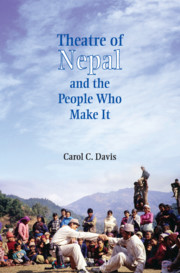Book contents
- Frontmatter
- Dedication
- Contents
- List of Figures
- Acknowledgements
- Prologue
- 1 From Darkness to Light: Antiquity through the Malla Golden Age
- 2 Ruthless Rulers: The Rise of the Shah and the Rana Takeover
- 3 The Drama of Nationalism: Sama Engaged
- 4 Modernism's Advance: Post-Sama Dramatists
- 5 The Pro-Democracy Movement: Ashesh Malla Takes to the Streets
- 6 Cultivating Theatre Aesthetics: Sunil Pokharel's Vision
- 7 Diaspora: Urban Theatre Outside the Capital
- 8 Legacy: Contemporary Theatre in the Kathmandu Valley
- Bibliography
- Index
3 - The Drama of Nationalism: Sama Engaged
Published online by Cambridge University Press: 26 April 2019
- Frontmatter
- Dedication
- Contents
- List of Figures
- Acknowledgements
- Prologue
- 1 From Darkness to Light: Antiquity through the Malla Golden Age
- 2 Ruthless Rulers: The Rise of the Shah and the Rana Takeover
- 3 The Drama of Nationalism: Sama Engaged
- 4 Modernism's Advance: Post-Sama Dramatists
- 5 The Pro-Democracy Movement: Ashesh Malla Takes to the Streets
- 6 Cultivating Theatre Aesthetics: Sunil Pokharel's Vision
- 7 Diaspora: Urban Theatre Outside the Capital
- 8 Legacy: Contemporary Theatre in the Kathmandu Valley
- Bibliography
- Index
Summary
We first want the progress of Nepal
—Balkrishna SamaAt the dawn of the twentieth century, the Ranas employed repressive means to maintain and stabilize their hold over Nepal. At the same time, other forces were coalescing to destabilize them. The middle classes were awakening to their obstructed rights and determined to break free of oligarchic oppression. The Ranas worked aggressively to stem the tide of liberalizing thought that was, in part, spurred by Western influences. They forbade the entry of almost all foreigners into Nepal, and those on official business, who could not be denied, were closely guarded and guided. Writing in 1949, W. H. Tilman looked back on the first half of the twentieth century and addressed this isolationist attitude:
For the rulers of countries like Nepal and Tibet, whose polity until very recent days was medieval feudalism, the wise and natural course was to exclude foreigners and their advanced ideas. And the poverty and remoteness of those countries made such a policy practicable… Writing in 1928 Perceval Landon (Nepal, 2 vols) estimated that only some 120 English and ten other Europeans had been permitted to enter the Katmandu valley; while from the time of Brian Hodgson (British Resident from 1833 to 1843) onwards not even the British Resident has been allowed to set foot outside the valley. Since 1928 the number of visitors to Katmandu must have increased considerably but the mesh is still fine. (Tilman 1983: 746)
The Ranas also made it difficult for regular Nepalis to leave the country or even to move freely throughout their own nation, forcing them to ‘obtain permits to travel into and out of the Kathmandu valley’ (Onta, 1997: 72). The Rana's isolationist efforts were frustrated when the British recruited 200,000 Gurkha soldiers to fight in World War I and took them to other parts of Asia, Europe, and the Middle East. By the time the Gurkhas returned home, they were imbued with new ideas gleaned from their exposure to modern social and political relationships around the world. Yet the Ranas continued to thwart uncompromisingly any local political movement aiming to undermine their authority. However, a counter movement was building steam surreptitiously, and political parties had begun to develop and unite against the Ranas.
- Type
- Chapter
- Information
- Theatre of Nepal and the People Who Make It , pp. 25 - 39Publisher: Cambridge University PressPrint publication year: 2019



